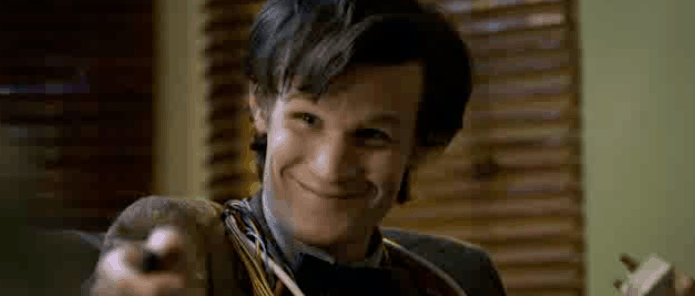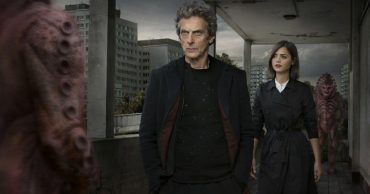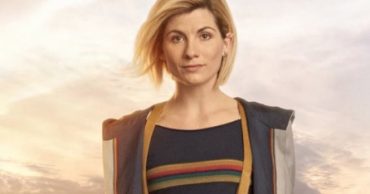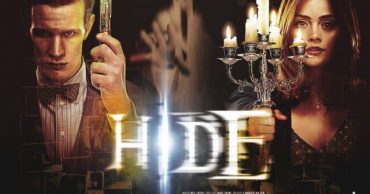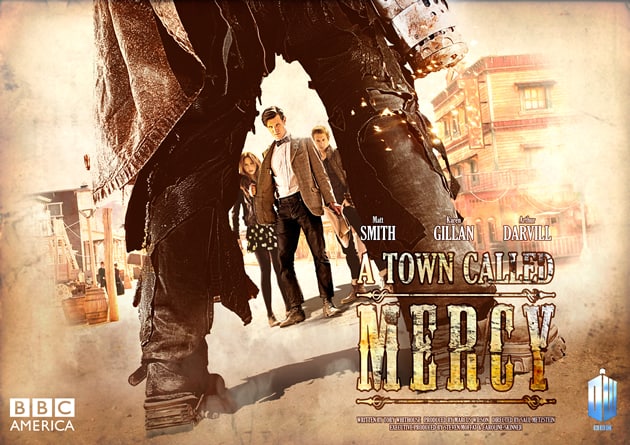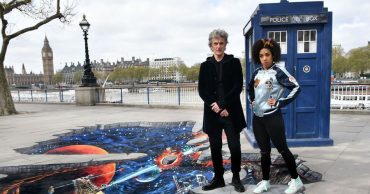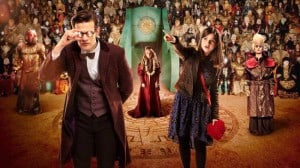 The Rings of Arkhaten, the second regular episode of the second half of season seven of the new Doctor Who (already you know you’re in for a complicated ride) feels like a bit like the new Who at its best and worst.
The Rings of Arkhaten, the second regular episode of the second half of season seven of the new Doctor Who (already you know you’re in for a complicated ride) feels like a bit like the new Who at its best and worst.
First, the worst.
There’s a certain sense of sameness setting in with Stephen Moffat (Doctor Who’s showrunner) that is becoming distracting apparent. Every writer, producer and director returns to certain recurring themes in his or her work. But with Moffat, it’s getting to the point where I feel we can write his go-to’s on index cards, shuffle the deck, and have a completed script.
The Rings of Arkhaten was so thick with Moffatian tropes it felt composed by checklist:
- Child in danger
- Second episode for a companion involving an elaborate off-world location where she, unique among the universe, will Save Us All.
- The use of High Emotion to solve impossibly complex sci-fi conundrums.
Then there are the newer standbys that also occur with alarming frequency
- Flying motorbikes in two out of the past two episodes.
- A companion’s childhood books foreshadowing events (Amy entire youthful library seemed to form the army faced in The Pandorica Opens, Clara’s 101 Places to See promises similar significance).
- The Doctor’s referred to the past two companions as “Impossible Girls.”
Lastly, Moffat resolves his episodes with a Big Speech which seems, at least for awhile, to solves everything. In The Rings of Arkhaten, these speeches were comprised entirely of long lists.
A quick episode recap:
It’s Clara Oswald’s second “proper trip” as a companion. Before they embark, we see The Doctor observing several key moments in Clara’s life: The moment her parents met (Clara’s mother rescues her father-to-be from being hit by a car while he is temporarily blinded by a leaf. Don’t ask). The father proposing to Clara’s mother by giving her the leaf, which he saved because it started the infinite chain of events that led to what old Hollywood producers would have called a “meet cute,” but Stephen Moffat treats with religious reverence. Clara’s mother reading to her and the mother’s early death. Clara at the funeral.
The Doctor asks Clara where, in their inaugural adventure, she’d like to go. “Somewhere awesome,” she replies. I was a bit surprised, as the preceding sentimentality suggested she might like to go back in time to see her mom again. But never-mind. It’s off to The RIngs of Arkhaten, where they go to the Pyramid to barter with aliens, rescue a doomed little girl and avert a totally awesome apocalypse.
The little girl’s role is to participate in a ceremony where she and others sing to an ancient deity in a Festival of Offerings. If she messes up the song, the deity will destroy the world, or the seven worlds, whatever they are. The singing sedates the deity and, along with “offerings” from every citizen, keep him sleeping. Cause if he wakes up – watch out!
Something goes wrong during the ceremony. What is never made clear. The girl is telekinetically lifted to the deity’s Evil Headquarters. The Doctor and Clara have to rent a flying moped to save her. After some stunningly bad CGI, they arrive to find the girl sealed behind a heavy stone door.
The Doctor uses his sonic screwdriver to lift the door. Because it is so heavy, he strains to do so. Although there is a throwaway line as to why the sonic can do this, it feels like another example of the sonic screwdriver working more like a magic wand than a plausible tool, even in sci-fi terms.
There is a lot of confusion as the episode races to the end. Some of the bad guys we’ve seen are just guards to the “real” villain, who is called Grandfather. For no particular reason, it turns out that even Grandfather is just a front for a bigger big bad, a sun-sized creature who, in it’s flaming massiveness, resembles a cosmic Jack-O-Lantern.
The little girl is ready to sacrifice herself to the Jack-Lantern, but the Doctor distracts her with Big Speech #1:
“All the elements in your body were forged many, many millions of years ago, in the heart of a faraway star that exploded and died. That explosion scattered those elements across the desolations of deep space. After so many millions of years those elements came together to form new stars and new planets. And on and on it went–the elements came together and burst apart, forming shoes and ships and sealing wax, and cabbages and kings. Until, eventually, they came together to make you.”
Clearly, she’s too important, too unique, to give her life for a creature even less believable than Galactus in the Fantastic Four movie.
Then, in a scene markedly similar to the one he issued at Stonehenge two season ago, The Doctor attempts to lecture Jack into surrender with Big Speech #2. I lack the energy for a word-by-word transcription, but it went something like:
“I’ve lived a long life and I’ve seen a few things. I was there when the last great time war marked the passing of the Time Lords. And I was there when I saw the birth of the universe and I watched as time burned out moment by moment until time ran out and it ran to nothing, no time, no space. I was the there when the laws of physics were written by a mad man…So come on then!”
His actual dialogue ran much longer, but you get the point. It’s worth noting that his last challenge to “come on then…” is very similar to from the Stonehenge speech and delivered identically. Matt Smith’s acting is aces here, but the material is familiar.
When the sun-monster survives The Doctor’s list-making, it’s up to Clara to save the day with Big Speech #3. Since the creature feeds off psychic energy, memories and objects of great meaning, she presents him with her most treasured memento – the leaf her father passed to her mother and her mother passed to her. Luckily, she carries it everywhere, as this is a sensible way to maintain a dried leaf.
“The most important leaf in history. The most important leaf in history.” Clara explains. Since she says this twice, we know its important and may return in future episodes. I was distracted wondering what possibly could have been the second most important leaf in history. Has anyone been keeping track of leaves’s cruciality in human events?
She continues (paraphrased again): “It’s full of stories, full of history. Full of the future that never got lived. Days that should have been in but never were. Passed on to me. This leaf isn’t just the past, it’s full of futures that never came.”
At this point, terrified that the little girl is also about to start speechifying, the bad guy blinks out of existence. To be fair, The Doctor explains it differently, that the infinity of outcomes the leaf represents far exceeds the vast number of events other objects do. But since this doesn’t make any sense – anything could be subject to the same butterfly-effect reasoning, I prefer my version.
This episode marked a turning point in Doctor Who for me. The first fifteen minutes were dynamite – fast-moving, beautifully played, touching and funny. But the story’s need for a major conflict seemed to play against Moffat’s real and only interest this year – the mystery of Clara Oswin Oswald, the latest Impossible Girl. Therefore, we got a rushed, by-the-numbers sci-fi romp that makes less sense the more you think about it. I get the feeling the episodes not devoted to Clara, or specifically leading up to the fiftieth anniversary later this year, will be depressingly formulaic. Of course, with great acting, spot-on casting, a terrific premise and a character with infinite possibilities, even formula can be tasty. But formula’s not as filling or good for you as the Real Thing. Here’s hoping Moffat gets back to telling great individual stories as he builds to his big climax.
 Follow Us
Follow Us
